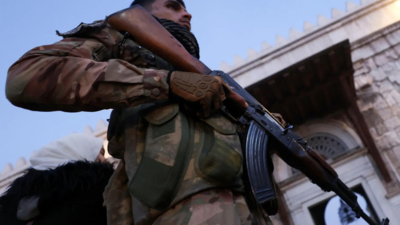
DAMASCUS: The rebels who ended the Assad family’s brutal rule in Syria began asserting control over the capital Monday, with fighters taking up positions outside public buildings and directing traffic in a show of their newly claimed authority.
Major questions remained unanswered, including who would lead the new government, as millions of Syrians and the wider world struggled to process the stunning end to the Assads’ decades-long reign, opposition activists sought to return from exile and foreign governments weighed how to deal with rebels they once designated as extremists and terrorists.
Euphoria around the ouster of President Bashar Assad over the weekend mixed with uncertainty about the future of country and the intentions of the rebel group that now holds the capital, Damascus, Hayat Tahrir al-Sham. Syrians who had fled their country’s 13-year civil war clogged the roads from Turkey and Lebanon to return home, as did people who had been displaced within the country.
But some who had supported the Assad government fear they could face retribution. And Monday, there were early signs of the lawlessness — broken windows of cars and shops — that many fear could spiral and grip the country. New York Times reporters entering Syria on Monday via Lebanon saw abandoned Syrian military tanks, empty checkpoints and ripped-up posters of Assad littering the main highway to the capital, Damascus.
Hayat Tahrir al-Sham has an Islamist leader, Ahmed al-Shara, formerly known by the nom de guerre Abu Mohammed al-Golani. It now faces the complex task of extending control over a country with deep ethnic, sectarian and religious divisions. The group’s military leadership said in a statement on Telegram that its forces were “about to finish controlling the capital and preserving public property,” and that a new government would begin work “immediately” after being formed. It did not specify who would lead the new government.
Here’s what to know:
—
Prisons:
Hundreds of Syrians were rushing Monday to Saydnaya prison, a complex near Damascus notorious for torture and executions, in the hopes of finding missing loved ones.
—
Israel:
After sending its forces into Syrian territory over the weekend, Israel continued to strike targets in Syria. In a letter to the U.N. Security Council, Israel’s ambassador labeled recent developments in Syria a threat to Israel’s security and said its military would “continue to act as necessary.” Prime Minister Benjamin Netanyahu said in a televised briefing Monday that Israel was willing to work with the new government. “We want to see a different Syria,” he said. “For our benefit, and for the benefit of the people of Syria.”
—
Assad in Russia:
Moscow will not disclose Assad’s location in Russia, Kremlin spokesperson Dmitry Peskov told Russian news agencies Monday. He added that President Vladimir Putin had made the decision to offer exile to Assad and his family, but that there were no immediate plans for the men to meet.
—
Arab pivot:
Arab nations had been working hard to bring Assad back into the fold, assuming he was there to stay. They now find themselves thinking through the implications of a post-Assad world in the Middle East, where Iran’s influence is crumbling and the power of Turkey and Israel has been enhanced.





